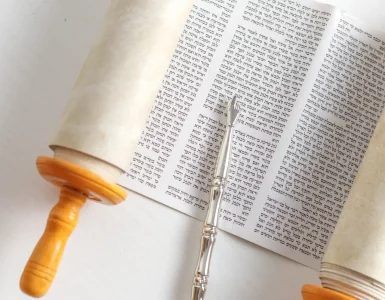Mishpatim 5779
‘And somebody who strikes his father or mother shall surely die’ (Shemos 21:12)
Paragraph
In this verse we learn of the grave sin of striking one’s father or mother. The Gemara in Sanhedrin (84b-85a) explains that one is liable to the death penalty for any blow that wounds one’s parent and causes bleeding, even if it does not mortally wound them.
Medical procedures often involve bleeding. Drawing blood for laboratory tests is an obvious example, but many other procedures – such as inserting vascular catheters, wound care, and even subcutaneous or intramuscular injections can also cause bleeding.
What should a person do if he needs to perform a medical procedure on his parent that may cause bleeding? Is there a distinction between an act intended to cause pain and injury (for which one would definitely incur the death penalty) and altruistic medical treatment?
This essay will examine several perspectives on this Halachic issue.
This issue is first dealt with by the Gemara. The Gemara (ibid.) asks whether a son may perform bloodletting for his father and records several opinions:
Rav Masna says that a son may indeed perform bloodletting for his father because it says in the Torah ‘Ve’ahavta Le’reyacha Kamocha’ – ‘you must love your friend like yourself’. When the Torah forbade a person from striking his father, it meant to forbid him from treating him in a way that would run contrary to Ve’ahavta Le’reyacha Kamocha’. If, however, a father wishes to be treated in this way, as in the case of asking his son to perform bloodletting, the son would not be transgressing a prohibition by acquiescing.
Rav Dimi also permitted it, butfor a different reason. In the Torah, the law of striking another man is juxtaposed with the law of striking another person’s animal. The law is that one may cause a wound to someone else’s animal if it was performed with therapeutic intent. We may therefore extend that same exception to wounding a person (including one’s parent). Performing any medical procedure on a parent does not meet the definition of injury and would therefore be permitted[1].
On the other hand, Rav and Mar brei d’Ravina forbid a son from doing anything that carries a risk of bleeding such as removing a splinter or draining pus from a boil due to the risk of committing a capital offense. According to these Amoraim, one may perform a medical procedure on anyone but a parent, even if there is a risk of bleeding, as causing bleeding would only be a violation of a Mitzvas Lo Sa’ase (Lav) (I,e, a Torah prohibition), so we certainly wouldn’t prohibit the procedure where there is only a possibility (Safek) of bleeding. In the case of the parent, however, where there is a possibility of a capital offense, it is forbidden to perform a medical procedure that might lead to bleeding.
According to the Sheiltos (Sheilta 60) the ruling of Rav and Mar brei d’Ravina forbidding even those proceduress that aren’t certain to cause a wound is a Rabbinic decree. The Netziv explains in the Haamek She’elo that if causing bleeding in the course of performing a medical procedure was a Biblical prohibition, the rule of Safek d’Oraysa l’Chumra would be invoked and it would be prohibited even to perform a procedure on a non-parent (as there would be no distinction between the transgression of a simple Lav or a capital offense). Therefore, this must be a Rabbinic decree and Chaza”l only forbade performing medical procedures on parents where the death penalty applies (in the case of an intentional wound) and not in others where it is at most a Lav.
The Ramban (Toras Ha’Adam, Inyan Ha’Sakkanah) contends that according to all the opinions cited in the Gemara if the bleeding is of actual medical benefit (such as in the case of bloodletting) it is certainly permitted. Rav and Mar brei d’Ravina forbade only those procedures that don’t inherently require bleeding (such as removing a splinter or draining pus from a boil). Since the bleeding is unnecessary, if the son were to cause bleeding, it cannot be considered part of the act of Refua and would therefore incur the death penalty. As such, a son is forbidden to perform these procedures on his parent out of concern that he may cause bleeding.
According to this approach, Rav Masna and Rav Dimi permitted a son to perform these actions notwithstanding the risk of causing unnecessary bleeding. In other words, if the bleeding is caused in the course of a medical procedure it would not be a violation of the prohibition. According to Rav Masna, since the father requested his son to perform the procedure, any bleeding that occurs is not a violation of ‘Ve’ahavta Le’reyacha Kamocha’ even though it is not an inherent part of the treatment. According to Rav Dimi, since the action is performed as a medical treatment, any bleeding that might occur would not fall under the prohibition of causing a wound.
The Ramban also writes that Rav and Mar brei d’Ravina only forbade a son from performing these procedures in a case where somebody else is on hand to do it instead. In that case, removing a splinter or draining pus is forbidden due to the risk of unnecessary bleeding as opposed to bloodletting where the bleeding is the actual therapeutic procedure. However, according to the Ramban, if there is nobody else available the son may remove the splinter.
There is a Machlokes among the Rishonim about the opinion of the Rif in this matter. The Ramban notes that when the Rif records the Gemara’s question about bloodletting, he omits the permissive opinions of Rav Masna and Rav Dimi, and quotes only Rav and Mar brei d’Ravina who forbid splinter removal and pus drainage.
The reason for the Rif’s omission, argues the Ramban, is that there is in fact no argument regarding bloodletting. Since the bloodletting is itself a medical necessity, as mentioned above, there would be no reason to forbid it other than the concern that he may inadvertently take more blood than is necessary. If so, then just as Rav and Mar brei d’Ravina do allow a son to remove a splinter from his father if nobody else is available (despite the risk of inadvertently causing a wound), so too could he take blood from him if nobody else were available. Of course, if somebody else is available, all of the Amoraim would agree that it would be better for another person to perform the bloodletting, as if he were to remove more blood than necessary he would only transgress a Lav and not a capital prohibition. The Ramban himself appears to agree with this understanding of the Rif.
The Rosh (Sanhedrin 10a), however, holds that according to the Rif the Amoraim do argue in all of the cases mentioned above and Rav and Mar b’rei d’Ravina would forbid a son to perform these procedures in all circumstances, even when nobody else is available. The Rif only quotes the strict opinions because he rules that it is always forbidden for the son to perform these procedures..
The Ramban’s understanding of the Rif is also the opinion of the Rambam in Hilchos Mamrim (5:7):
“Somebody who performs bloodletting for his father or a doctor [who] cut away some of his [father’s] flesh or amputated his limb is exempt. Nonetheless, he shall not do so in the first instance. Nor shall he remove a splinter from his father or mother lest he create a wound. This ruling only applies when somebody else is available to do it. But if there is nobody else and they are in pain he may take their blood and operate upon them according to their wishes.”
The Shulchan Aruch (Y.D. 241:3) rules according to the Rosh’s understanding of the Rif that it is forbidden for a son to treat his father where there is any risk of bleeding, even when nobody else is available to do it instead. The Rema disagrees (in line with the Ramban’s understanding of the Rif and the Ramban) and permits a son to treat his parent when no one else is available.[2]
***
According to the Ramban, Rambam and Rema it is permitted for a son to perform certain medical procedures on his father when there is nobody else available to do so. The Poskim discuss which circumstances can truly be considered that there is ‘nobody else available’?
- Aruch Ha’Shulchan (YD 241:6) rules that when the son is a more expert doctor than his colleagues and his father wishes that he perform the procedure, it is considered as though ‘there is nobody else available’ and he may do so.
- Chelkas Ya’akov (2:39) goes one step further, ruling that if the father wishes for his son to perform the procedure, then he may do so even when his expertise is equivalent to his colleagues.[3]
- Chelkas Ya’akov also argues that if the father is in actual danger, the son may operate upon him even if other doctors are available[4].
- Minchas Yitzchak (1:27) writes that if the father will need to be transferred to a hospital if we do not allow the son to treat him at home, it is permitted for the son to treat him. The same would apply to a case where the father requires constant (i.e. daily) care. If prohibiting the son from performing the treatments would cause the quality of the treatment to suffer, it is permitted for him to do so.
- Minchas Shlomo (1:32) cites Gesher Ha’Chayim[5] who rules that in a case where hiring a doctor will come at a cost (but the son is able to treat his father for free) then it is permitted for him to do so. This is also considered ‘there is nobody else available’.
Rav Tzvi Pesach Frank zt”l (Har Tzvi Y.D. 197) disagrees with this leniency. He maintains that the son must pay a doctor to treat his father to avoid the risk of violating the prohibition of wounding his father in the course of performing the treatment. Even though a son is not obligated to spend his own money in performing the Mitzvah of honoring his father, in this case he would be spending the money to avoid a possible violation of Halacha.
Rav Tzvi Pesach considers this analogous to the case of a father who asks his son living far away to visit him. The son is obligated to pay his own travel costs since he could have walked and chose to travel more expensively only to save his own time and effort. So too in our case, the son’s concern about wounding his father is his own personal Halachic issue, independent of the obligation to honor his father, and he therefore needs to pay for any related expenses – i.e. treatment that he could have provided himself for free.
Rav Shlomo Zalman Auerbach zt”l argued that the two cases are dissimilar. In the case of the son who must travel to his father, the travel expenses are entirely due to the son’s needs and desires. In our case, the reason that he should be prohibited from treating his father is because of the very fact that he is his father. As such, the expenses of treatment would actually be caused by the father and the son is therefore not obligated to assume them. (See Nishmas Avraham Y.D. 241)
Rav Shmuel Wosner zt”l also ruled on this issue (Shevet Ha’Levi 10:159). He writes that whilst he is reluctant to rule that the son be allowed to treat the father in these circumstances, he doesn’t believe that he is obligated to spend a large amount of money on hiring someone else. Since the son is permitted to treat his father when no one else is available, we see that the fear that the son will wound his father beyond that which is required for the treatment is not something that we are greatly concerned about[6]. If we were truly worried about this possibility we would never have ruled that it is permitted in the case where nobody else is available. Treatment by a son is something that ideally should be avoided but one is not obligated to spend exorbitantly in order to do so.
[1] It follows that according to Rav Dimi one may perform a medical procedure that causes one’s father to bleed even without his consent.
[2] It is the custom of some Sefardim to follow the more stringent ruling of the Shulchan Aruch. The Ben Ish Chai (Shoftim 24) however rules like the Rema.
[3] Minchas Yitzchak (1:28) disagrees with Chelkas Ya’akov’s ruling.
[4] Minchas Yitzchak (ibid.) disagrees here too. If the other doctors are equally qualified, he writes, why should the fact that the father is in danger permit the son to operate upon him?
[5] As well as Yefeh Leiv
[6] It can be compared to the general license that a doctor has to ‘wound’ his patients in the interest of healing them. We do not say that a doctor should avoid doing so lest he inadvertently wound them beyond the needs of their treatment. Rather the treatment, for better or for worse, becomes part of the license he has from the Torah to treat his patients. This is true even if he errs on occasion.













Add comment